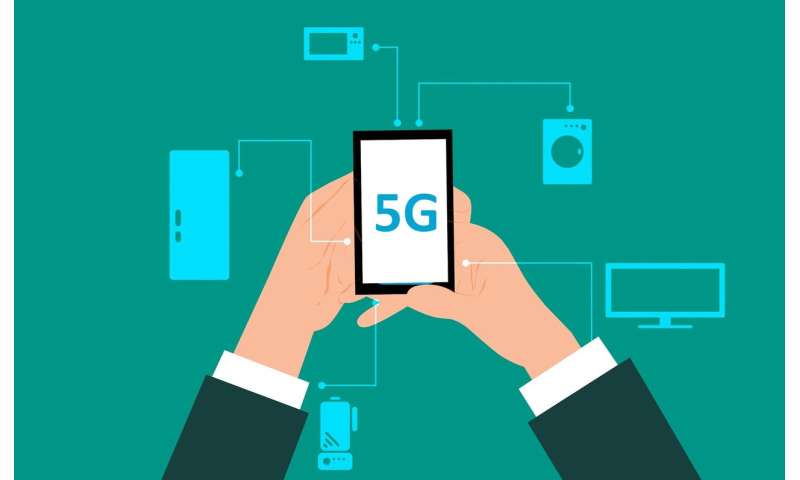
Wireless companies will continue developing their 5G networks in Chicago in 2020, but it will be years before most consumers take advantage of the ultrafast download speeds.
Businesses are figuring out how they can best use the fifth generation of wireless, and expect it will lay the foundation for high-tech advancements. But before it's widely used among consumers, more people have to buy smartphones and other devices that run 5G. Also complicating matters are efforts to stop the networks' rollout in the area because of safety concerns.
"Right now, I'd say 5G is in the hype cycle. Deployment is going to be slower than people think," said Mohan Sawhney, a professor at Northwestern University's Kellogg School of Business. "Yeah, you'll get faster internet, but that's not a breakthrough. ... I'd stay tuned beyond 2020."
Sprint, Verizon, T-Mobile and AT&T all turned on their 5G networks in and around Chicago in 2019. The wireless companies are focused on reaching more people with more consistent coverage next year.
As the carriers launched their networks, they started selling 5G-compatible devices. Apple, which dominates the cellphone market in America, notably has not.
The devices that are available don't come cheap, often costing between $900 and $1,300. That means most of the customers that already made the switch to a 5G phone are early adapters and tech enthusiasts, Sawhney said. Many cellphone users feel their download speeds are fast enough, and it could be several years before they buy a 5G device, he said.
Unlike consumers, businesses will likely start using 5G in 2020, said Joseph Doering, who leads Accenture's communications, media and telecom practice in the Midwest.
In an Accenture survey of 100 Chicago business executives, 46% of respondents said they believed 5G will have a significant effect on their business in one to three years.
"You have every major business out there looking at how that (5G) is going to be impacting their business, not just in 2020, but beyond," Doering said. "It's very strategic and competitive ... how do they get there and get here first."
It's hard to dream up all the ways 5G could be used commercially, Doering said. If a concert venue in Chicago launched a 5G network, the venue might eventually be able to broadcast a hologram of Taylor Swift performing a concert in Tokyo, he said.
Verizon turned on 5G at the Chase Center in San Francisco and let select attendees tap into the network at The Chainsmokers concert in November, according to a news release from the stadium. The concertgoers could hold their phones up to the stage and see the band through an augmented reality lens. The show's producers were controlling graphics the attendees saw on their phones, and timing them with the music.
5G can download data at least 10 to 20 times faster than its predecessor.
On Sprint's network, an Austin Powers movie downloaded in less than a minute last summer on a phone being tested on North Michigan Avenue. On Verizon, all two hours and 17 minutes of "Homecoming: A film by Beyonce" took only 9 seconds to download on a phone being tested near Millennium Park.
The network follows four previous generations of wireless, each of which changed the way people interact with their cellphones. The first ushered in mobile phones and the second brought texting. 3G laid the groundwork for smartphones, and 4G allowed video streaming and more.
Since 4G was widely adopted, data use has exploded. People use 40 times more data on mobile devices than they did in 2010. 5G networks, which also allow for greater quantities of data streaming, are wireless companies' attempts to satisfy that demand.
But not everyone is embracing 5G, and concerns could cause hiccups for a broader rollout.
The technology has sparked concerns about potential health issues, and some say the 5G equipment popping up on street corners, telephone poles or elsewhere is an eyesore that could hurt property values. Residents in Hinsdale, Western Springs and Oak Brook have raised concerns.
5G taps into millimeter waves at the top of the radio spectrum. The higher waves allow for faster transfer of data, but they don't travel through buildings, trees and rain like previous generations of wireless, which operate on lower wavelengths. Some wireless companies must install more antennas, cables and other equipment to provide coverage.
Wireless industry association CTIA says typical exposure to 5G infrastructure is comparable to Bluetooth devices and baby monitors, and there is no scientific evidence of adverse health effects.
One group, called "Stop 5G Chicago," is aimed at halting the rollout of the network in residential areas.
East Beverly resident Kristin Welch co-founded the group. The mother of three said she expects a stronger pushback against 5G from Chicago-area residents in 2020, as more equipment is installed in communities.
"Until it appears and until it becomes real, it is fighting a boogeyman," she said. "There's not awareness until they physically see a tower showing up in front of their home and their children's school."
©2019 Chicago Tribune
Distributed by Tribune Content Agency, LLC.
Citation: 5G arrived in Chicago in 2019. What will happen with the fifth generation of wireless in 2020? (2019, December 25) retrieved 25 December 2019 from https://techxplore.com/news/2019-12-5g-chicago-wireless.html
This document is subject to copyright. Apart from any fair dealing for the purpose of private study or research, no part may be reproduced without the written permission. The content is provided for information purposes only.
